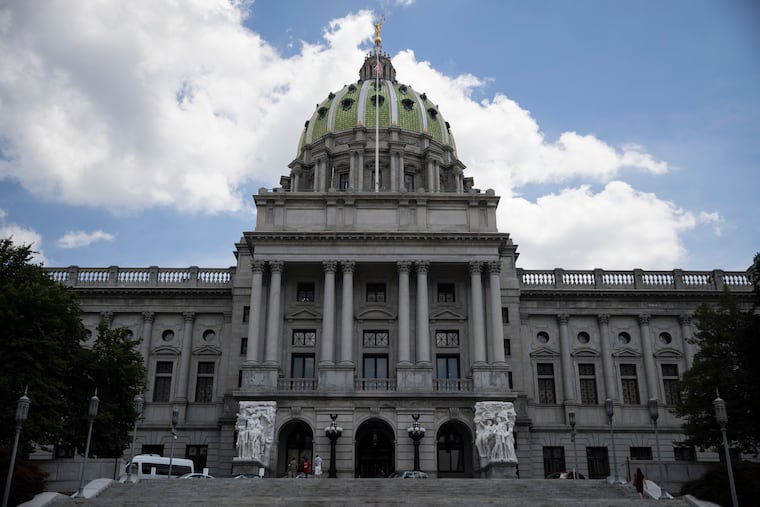Fixing public pensions with private creativity
Private-sector firms put all their assets on the balance sheet, even nebulous things such as "good will." Governments don't but should.

New Jersey, Pennsylvania, and the city of Philadelphia have massively underfunded pension plans that are sucking the life out of their budgets. Unfortunately, little imagination has been used to develop plans to alleviate the problem other than requiring the beneficiaries pay. But there are realistic alternatives, and it is time to implement them.
Let's be clear: The pension plans are underfunded because they have been underfunded. The government entered into employment agreements to provide pensions at certain levels. But when the going got tough fiscally, the politicians stopped funding the pensions at required levels.
You can argue that the pensions are too generous, not affordable, were the result of political power, or bad financial management, but you can say the same things about the level and type of taxes and spending. All government decisions are political.
The standard approach to correcting the decades of fiscal mismanagement is to say the pensions are no longer affordable and have to be cut. That way, only government workers/retirees feel the pain.
Accepting that the government can shortchange workers, though, is a dangerous precedent.
What about businesses? Consider construction firms that build government office buildings, roads, or schools. Would informing them that the government didn't have the money to pay the full contract amounts because it had to use the funds for other purposes be any different from telling public workers that their contract to receive a pension would be reduced so the money could be spent on other line items?
Instead of forcing only workers and retirees to pay for correcting the underfunded pensions, pension fund assets could be increased.
Governments, like businesses, have balance sheets that include assets and liabilities. Pension plan assets are, for the most part, investments. The returns were supposed to support the growing pension needs, but alas, they do not. Be it lousy investment managers, unexpected economic crises, overestimated expected returns, or underestimated costs, the assets don't support the liabilities.
Indeed, New Jersey ranks near the bottom when it comes to funding ratios or fiscal ability to pay pension costs. Pennsylvania is not much better and Philadelphia is in similar shape. So something has to be done.
One suggestion has been to do what businesses do: End the traditional pension plans and impose 401(k)-type plans. Unfortunately, that is not feasible.
The government cannot easily switch to a 401(k)-type plan for one big reason: Government workers pay into their pension plans but private-sector workers didn't. Stopping the pension plan means the governments lose the retirement payments of workers, while still being liable for the vested defined benefit pension costs. The huge transition costs to 401(k)-type plans have made the private sector model unaffordable to governments.
The other proposals are the standard ones: Reduce benefits and raise the retirement age. Basically, force the recipients to pay for the fiscal and political irresponsibility that created the problem.
But that will continue to create major political battles, pitting nongovernment workers against government workers and retirees.
Thankfully, there is a different way governments can emulate the private sector: Treat their balance sheets like private-sector balance sheets.
Private-sector firms put all their assets on the balance sheet, even nebulous things such as "good will." Governments don't but should.
As the New Jersey Economic Policy and Workgroup put it: "Governments at all levels own, operate, manage, or otherwise control a wide range of assets and activities. Many … have an inherent value that goes unaccounted for because there has been no incentive to capture the 'market' value of these assets. Capturing these inherent values would reduce the unfunded pension liability, thereby freeing current and future budgetary resources for other needed investments such as infrastructure, education, public safety, and social safety net programs."
All governments have these assets. The biggest and most obvious are the New Jersey and Pennsylvania Turnpikes, PGW, and even the Philadelphia Parking Authority.
But we don't have to look at just the obvious ones. All three governments have massive amounts of land, parks, buildings, and real estate that could be moved onto pension balance sheets, raising the level of assets, reducing the level of underfunding, improving credit ratings, and even providing additional funds.
It is time for our state and local government officials to do the unimaginable: Start thinking imaginatively. They should catalog their assets and move as much as possible into the pension plans. The benefits of more adequately funded pension plans may not translate into more votes, but they would create healthier environments to grow the economies.